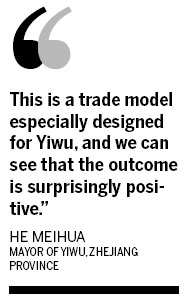Zhejiang gets boost with new export tactics
China didn't meet its 8 percent export growth target last year, leaving many wondering if overseas sales could remain a driving force of the nation's economy.
However, one city outperformed: Yiwu in Zhejiang province, which recorded a gain of 150 percent in exports to $9.01 billion.
The rapid rise continued in the first half of this year as Yiwu's exports hit $9.43 billion, up 408 percent.
The largest contributor to this blistering pace has been a new type of trade - the export of commodities bought at shopping malls.
According to Yiwu's statistics, such shipments have accounted for just under 78 percent of the city's total exports so far this year.
"This is a trade model especially designed for Yiwu, and we can see that the outcome is surprisingly positive," said Mayor He Meihua.
This new model of trade differs from the traditional export business, which involves loading containers, customs clearance, inspection and quarantine and taxation.
The new model of trade started trials last August. It is considered a breakthrough in Yiwu's international trade reform and upgrading, which began in 2011.

Lou Zhangneng, director of Yiwu's commerce bureau, said that the new process makes the export of small commodities from Yiwu much more efficient.
"China's traditional method of trade and related regulations are designed for exports of commodities from factories. One container will usually have only one type of goods, or perhaps a few, but the regulations are not suitable for Yiwu," he said.
As the world's largest market for small commodities such as accessories, toys and household gadgets, Yiwu's exports mainly consist of small items purchased by foreign individuals from the city's shopping malls. Each person buys a small assortment of goods.
Unlike the situation elsewhere in China, "export containers from Yiwu will have dozens, even hundreds of categories of commodities, each category from different stalls of shopping malls. It is time- and money-consuming for the customs clearance and inspection and quarantine departments if we follow customary trade procedures," said Lou.
He Fenghua, general manager of Yiwu Kunpeng International Transport Co, said that since the new trade model began, the company's profit has grown by 10 to 20 percent.
"It took 20 to 30 minutes to conduct customs clearance in the traditional way, and it required at least one employee of the company to follow the whole procedure. Under the new model, however, it takes no more than five minutes. Everything can be done online," he said.
He's company serves as an international trade agent linking foreign purchasers with sellers in shopping malls in Yiwu. The company charges service fees for transportation, warehouse services, customs clearance and shipping.
"We can save two to three days on the whole export procedure now, which saves us lots of money. Service frequency has increased as well," he said.
He's company has 5,000 square meters of warehouse space, which is filled with commodities purchased by foreign customers. His eight transportation teams, each with 20 to 30 cars to carry containers, are so busy they can't keep up.
Samir El Halad, general manager of El Esraa International Trading, is a client of He's from Egypt. Purchasing shoes from Yiwu, Halad has at least 20 standard containers shipped from the city to Egypt every week.
Halad, who wasn't familiar with Yiwu's new policy, said he had noticed that purchasing had become faster and cheaper now.
"The total fee for shipping one standard container to Egypt used to be 20,000 yuan," or about $3,260, he said. "Now the fee is 15,000 yuan." Halad plans to expand his weekly purchasing volume by 10 standard containers.
But the new trade model is not the only explanation for Yiwu's increase in export volume. The basic reason for the tremendous growth rate of Yiwu's exports is the return of local trade agencies as a result of new policies.
The tax rules state that exported commodities are subject to a 17 percent value-added tax. Since most vendors in Yiwu only provide ordinary receipts rather than formal invoices for tax purposes, there are no tax exemptions or refunds on these purchases.
Exports of small commodities from Yiwu have been long been conducted by trade agencies registered in cities outside the province, which are eligible for export tax exemptions.
Chen Wentong, president of Changhang International Logistics Co, said that the discrepancy in tax treatment puts international trade agencies in Yiwu at a disadvantage.
"The profit on small commodities is as thin as 5 percent. How can we also carry a 17 percent tax rate?" he said.
The new tax rules extend the exemption to local companies.
Lou said before the tax change, exports handled by agencies outside the province were counted as the exports of those provinces.
"The figures starting from last August reflected 90 percent of Yiwu's actual export performance. The city's contribution to the whole province's export growth reached 55.3 percent," he said.
Lou also explained that having local companies conduct foreign trade can also help increase quality supervision.
"When quality problems occur, it is easier to track local companies than those outside the province. It helps Yiwu build a better image," he said.

























